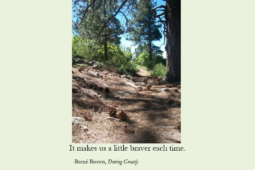While addressing limiting beliefs and reframing negative thoughts is incredibly powerful and a game changer for those of us that learn to reframe and turn limiting beliefs into empowering beliefs, is there a limit to how far this practice can take us? Does it work on all the thoughts that we think? This is important because our thoughts impact our life.
Our thoughts impact our life. They make a difference.
In my journey to change and improve my situation, I started reading and listening to people that had already improved their situation. It helped me immensely to engage this type of content. It provided me with ideas, insight, and hope.
Since becoming more intentional about my personal growth I’ve noticed a change in my default thoughts or responses to questions. I have stronger answers to certain questions and some of the questions that would have deflated me in the past (due to a lack of confidence) don’t. Listening to podcast interviews from people that do research on the brain, or understand behavior in an eye opening way, or who have discovered a tool to help them gain traction in life, helps me continue to rid myself of straggling negative thoughts that want to stick around.
This can all be summarized by remembering that what goes in will also come out. I have heard this theme in several podcasts that discuss making changes in your life as well as in personal growth and productivity focused online courses. The idea is that if you fill your brain with inconsequential content, stress inducing content, or negative content, that’s what will come out. On the other hand, if you fill your mind with empowering content, that’s what will come out.
Therefore, if we are facing our negative thoughts and working to overcome limiting beliefs it can be helpful to also surround ourselves with content that reinforces what we want to think about and express.
Overcoming thoughts at a deeper level.
While addressing limiting beliefs and reframing negative thoughts is incredibly powerful and a game changer for those of us that learn to reframe and turn limiting beliefs into empowering beliefs, is there a limit to how far this practice can take us? Does it work on all the thoughts that we think?
In my experience, the answer to that last question is no. At least not in the way it’s explained by the personal development world. While the strategy for overcoming limiting beliefs helps me in terms of what jobs to apply to and when thinking about what I am capable of accomplishing in a day or a year, there are some thoughts that need a deeper practice to overcome.
What are these thoughts?
If you read my article that introduced this category for my blog, it mentioned good and bad in the unconscious heart. What the personal development world doesn’t talk about are thoughts that feed in an unhealthy way on our inner desires. These are the types of thoughts that need more than the beginning steps of reframing.
Our inner desires run amuck (called passions) lead to thoughts that need a deeper strategy- a strategy that enters into the heart through what is called the prayer of the heart. These thoughts and the deeper strategy are the topic of the book I mentioned in last month’s introductory post. It is also the source for the remaining paragraphs in this article.
The book is Confronting and Controlling Thoughts. The writing on thoughts found in this book is very accessible. It is extremely helpful for gaining insight into the urgency of not simply learning to reframe thoughts, but to guard your mind from negative and distracting thoughts.
An introduction to logismoi.
These negative and distracting thoughts are called logismoi. There are actually 2 kinds of logismoi: 1) thoughts of peace and joy and 2) thoughts of anxiety and turmoil. The thoughts that we need to confront urgently are those that are of anxiety and turmoil, those that distract, and those that keep us focused in a negative direction other than focused on God.
In “Confronting and Controlling Thoughts”, St Thalassius is mentioned as describing the source of logismoi as being from 1) the senses 2) memory and 3) the body’s temperament. What we take in, what we remember, and our temperament are sources or entry ways for logismoi to enter our heart.
Positive Input
This brings me back to what I mentioned at the beginning of the article. What we take in will come out.
A quote in Confronting and Controlling Thoughts was helpful for my own understanding of this connection.
The mind is like a clock that is constantly running down, someone said. It has to be wound up daily with good thoughts. We need to start storing God’s powerful words in our memory bank as well as in our heart.
from Confronting and Controlling Thoughts by Anthony M. Coniaris
Taking in readings from the Bible is an important part of filling your mind and heart with the positive thoughts needed to overcome passions and logismoi.
What does this have to do with personal development?
It’s important because our thoughts impact our life!
A person that thinks confidently sees opportunities. A person that thinks they will never amount to anything misses opportunities. Consider thoughts that lead us to feel overly anxious, depressed, or bitter. These thoughts might not easily be affected by the typical personal development strategy of reframing. If unattended these negative thoughts will affect our life in negative ways.
If a thought that is unhealthy for us to keep focusing on takes root in our hearts, we are not able to grow.
More to Come.
There is so much that I could write about this topic. I’m sure there will be more to come.
In fact, next month, if all goes according to plan, I will continue this mind and thoughts theme by taking a look at the book, Our Thoughts Determine Our Lives. Be sure to check back on the 4th Thursday of the month for the next post in the faith and behavior category.
Until next time, have you tried reframing certain thoughts only to feel like you can’t overcome them?
Behavior Challenge: Is there a scripture that you can memorize to help keep your mind thinking positive thoughts?
Resources:
Still not sure what I mean by passions? Here’s a short intro post on the essence of the passions.
Not sure what the prayer of the heart is? Read this short into post on the prayer of the heart.
Other Posts:
I mentioned in my introductory post on faith and behavior the importance of making connections between science and faith .




 One behavior change at a time.
One behavior change at a time.







Recent Comments